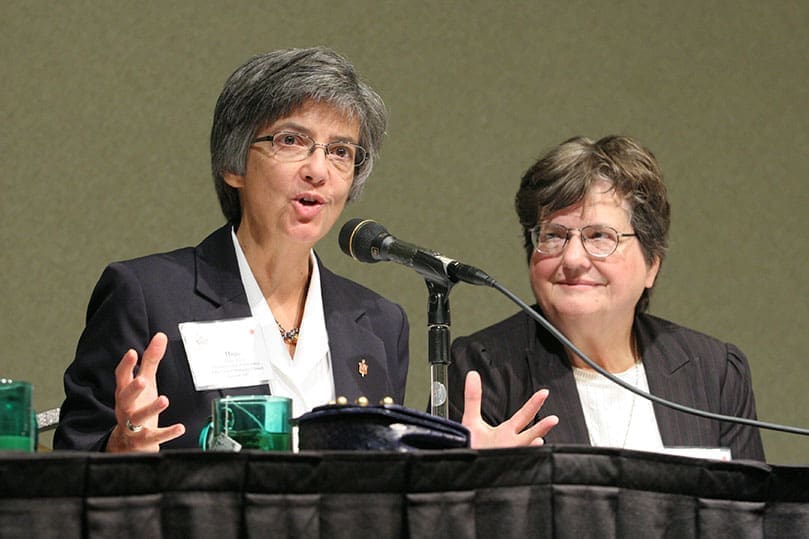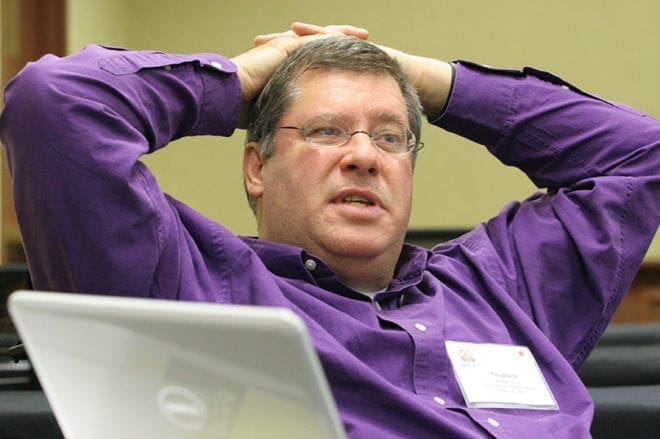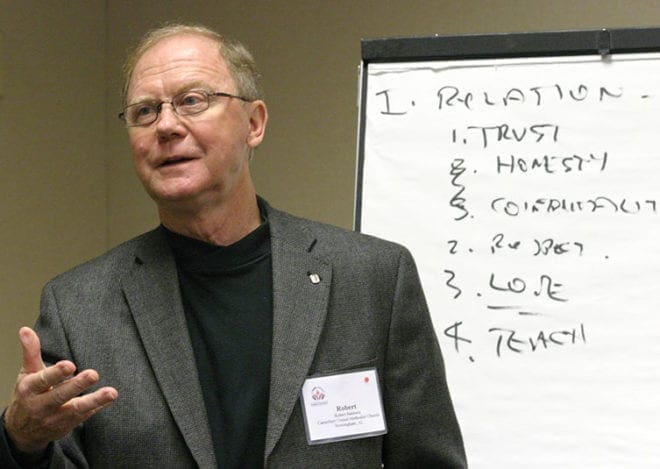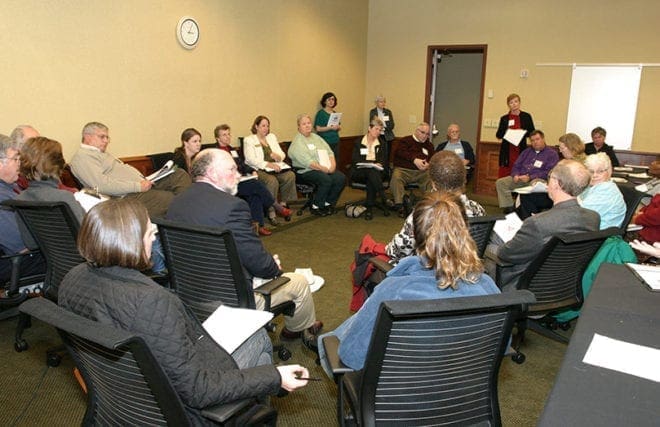 Photo By Michael Alexander
Photo By Michael Alexander
Atlanta
Event Gathers People Seeking To End Death Penalty
By ANDREW NELSON, Staff Writer | Published November 25, 2010
Debbie Biesack has stood among marchers at the Jan. 22 pro-life rally in Raleigh, N.C., and held a banner calling for a consistent protection of life. And she notices people shy away.
“People are afraid to be associated with us,” says the 46-year-old Catholic substitute teacher and veteran of the January marches that mark the Roe v. Wade decision legalizing abortion. “You can tell that we are separate.”
Advocates against the death penalty say they want to expand their numbers and educate people to see beyond their one-issue concerns, whether it’s abortion or the death penalty.
The Catholic Church may have a consistent message of the sanctity of all life—from conception to natural death—but people in the pews do not.
And while there is a changing view on the death penalty among Catholics, close to half agree with it. A 2005 poll by Zogby International found some 48 percent of Catholics support capital punishment, down from a high of 68 percent.
People of Faith Against the Death Penalty hosted a two-day conference in Atlanta on Nov. 16 and 17. Close to 200 people from across the country joined the effort to launch a campaign to heighten opposition to capital punishment from the religious community.
Some 20 Catholics at the conference met in a “faith caucus” to share ideas on the movement.
Father Stephen Wolf, of the Diocese of Nashville, Tenn., said, “I just think it’s wrong.”

Father Stephen Wolf, associate pastor of St. Henry Church, Nashville, Tenn., and a member of Tennesseans For Alternatives To The Death Penalty, said his involvement in programs opposing the death penalty date back to his seminary days 15 years ago in Illinois. Photo By Michael Alexander
“What we are teaching our children is it’s OK to use violence even when you have alternatives,” he said.
When he preaches about the death penalty, Father Wolf said he knows people after Mass will tell him that he is wrong. But Pope John Paul II clearly spoke that capital punishment is unnecessary in the contemporary world, he said.
“Everybody is pro-life about something. I think that’s the wisdom of the Gospel of Life,” he said.
Deacon Dick Tolcher, of the Atlanta Archdiocese, said the conference brought together people from across the country to explore the issue.
Some 15 states have abolished the use of the death penalty, New York, New Jersey and New Mexico in recent years, and it looks like two more states have legislation in place to ban it, he said.
“To me, that’s the encouraging thing about it. There’s progress being made,” said Deacon Tolcher, who is the coordinator of prison and jail ministry for the archdiocese and serves at St. Philip Benizi Church, Jonesboro.
Karen Clifton, director of the Catholic Mobilizing Committee, said Catholics are out in front of the movement to ban the death penalty. And if the 67 million church members backed the idea, executions would stop, she said.

Robert Baldwin of Birmingham, Ala., lists and shares the characteristics one must bring to prison in a serious effort to minister to death row inmates. Photo By Michael Alexander
“The leaders of this movement are Catholic. We are huge,” she said. “We should come together to talk about these hard issues.”
The Catechism of the Catholic Church, quoting Pope John Paul II, limits the use of the death penalty to “very rare, if not practically nonexistent” situations.
The catechism states: “Assuming that the guilty party’s identity and responsibility have been fully determined, the traditional teaching of the Church does not exclude recourse to the death penalty, if this is the only possible way of effectively defending human lives against the unjust aggressor.
“If, however, non-lethal means are sufficient to defend and protect people’s safety from the aggressor, authority will limit itself to such means, as these are more in keeping with the concrete conditions of the common good and more in conformity to the dignity of the human person.
“Today, in fact, as a consequence of the possibilities which the state has for effectively preventing crime, by rendering one who has committed an offense incapable of doing harm—without definitely taking away from him the possibility of redeeming himself—the cases in which the execution of the offender is an absolute necessity are ‘very rare, if not practically nonexistent.’”
Biesack said the conference energized her and she’ll be lobbying her North Carolina legislator to ban the death penalty.
“There was so much hope having so many people. The end of this could be in sight. You feel like the future is coming,” she said.

As groups gathered in the afternoon by faith tradition, Karen Clifton, standing right, executive director of the Catholic Mobilizing Network To End The Use Of The Death Penalty, Washington, D.C., leads a discussion among Catholics in attendance. Photo By Michael Alexander
The Kairos Conference, which took place at the Emory Conference Center Hotel, included two days of workshops, from learning how the death penalty is imposed on a prisoner to serving as a chaplain to death row men and women.
During a panel discussion, Sister Helen Prejean, a member of the Congregation of St. Joseph and author of “Dead Man Walking” and “The Death of Innocents,” said religious communities issue “beautiful statements” opposing the death penalty, but do little else.
“The silence in the religious communities in all these years has been overwhelming,” she said. “We’ve been complicit. We did not act. We have not stood up. We have not helped our people stand up,” she said.
Leaders from other faith traditions added their voices to the campaign.
The Rev. Dr. Raphael Warnock, pastor of Atlanta’s Ebenezer Baptist Church, called capital punishment the flashpoint for the massive incarceration rates of African-Americans, which he called “slavery by another name.”
“The death penalty is the third rail of American politics. Faith communities will have to lead the way,” he said.
Rev. Dr. David Gushee, founder of Evangelicals for Human Rights, said conservatives who want to reduce the power of the government should embrace doing away with the death penalty.
“The power to kill its own citizens is the ultimate power of the government,” he said.
Rev. Gushee said trusting courts to correctly impose the death penalty runs counter to the conservative principle of limited government. It places a trust in the government that conservatives rarely show in other areas, from regulating health care to implementing foreign policy, he said. “It trusts government too much.”
For information about People of Faith Against the Death Penalty, see www.pfadp.org.